Chefs Reveal Why Reuben Sandwiches Always Taste Better At A Restaurant
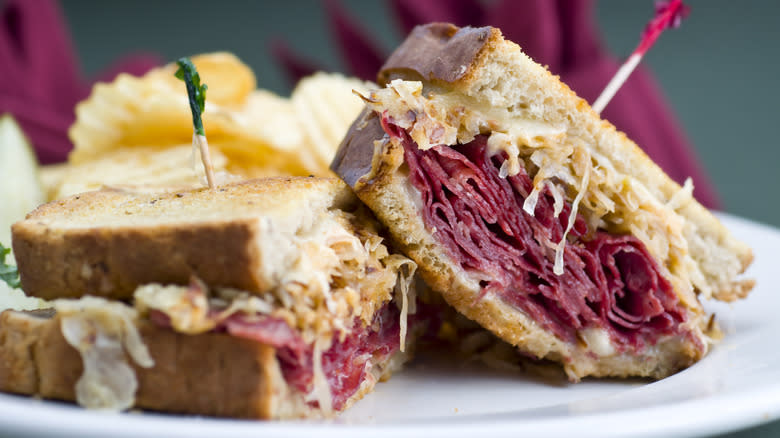
Nobody really knows its exact origins, but every sandwich fan worth their salt knows how to build a solid Reuben. Two slices of rye bread envelope corned beef, Swiss cheese, sauerkraut, and a hearty portion of dressing (preferably Russian or Thousand Island). In other words, it's a cheesy, meaty, messy, carb-tastic delight that's more than earned its prime position on the menus of the nation's finest delis. But it's surprisingly difficult to replicate to the same satisfying levels in your own kitchen.
That's because perfecting a Reuben requires a balance of flavors and textures that can take trial and error to perfect. Too much sauerkraut, for example, and you run the risk of a soggy sandwich. On the other hand, if the rye bread has been sliced too thick, your sandwich may be dry, while too much corned beef may make the resulting meal too salty. Like we said, it's an art.
If you don't have the time to start experimenting with the perfect ratio of meat to Swiss, the good news is that three experts have already put in the effort for you. We spoke to Elyssa Heller (owner of Brooklyn eatery Edith's), Anthony Lygizos (owner of Denver-based Leven Deli & Co.), and Stefano Mariota (executive chef at Brooklyn's Gertie) to discover how the professionals take their Reubens to the next level. Forget everything you thought you knew about Reubens -- these are the steps you'll want to follow from now on.
Read more: Steakhouse Chains Where The Sides Outshine The Steaks
The Bread Is Toasted
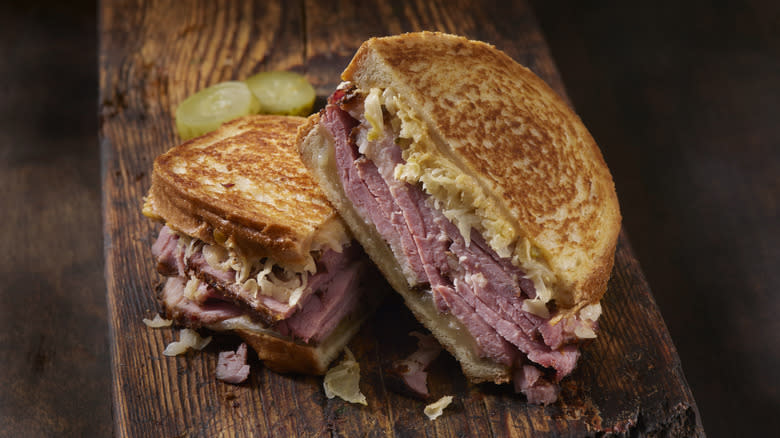
Rye has always been the go-to bread for a Reuben. Darker in color and stronger in flavor than your typical white bread, there's no better choice to handle the strength of flavors contained between each slice. However, if you really want to perfect your Reuben like the pros, there's one thing you need to do to your rye: toast it.
"We were really dead-set on toasting our bread to give it that extra texture, because the sandwich itself is pretty fatty," explains Elyssa Heller, founder of Brooklyn eatery Edith's which is renowned for its take on the Reuben (aptly titled "The Edith"). "You have the classic Russian dressing, you have pastrami, you have the cheese -- it's a really heavy sandwich typically. We thought that toasting the bread would give it a really nice crunch and just add a little bit of a different texture."
There's a practical element to toasting a Reuben, too. It doesn't just give a sandwich extra crunch, but it also boosts its durability against the dressing and sauerkraut. As it turns out, the experts aren't just toasting the bread dry, either. As per Anthony Lygizos -- who owns Denver's "one part Jewish Deli, one part Mediterranean restaurant" Leven Deli & Co. -- this step can add another layer of flavor to an already flavorful sandwich, presuming you use the right sort of ingredients. "We're suckers for grilling our sandwich bread with a little bit of olive oil," Lygizos reveals.
Bread Is Sliced Extra Thick
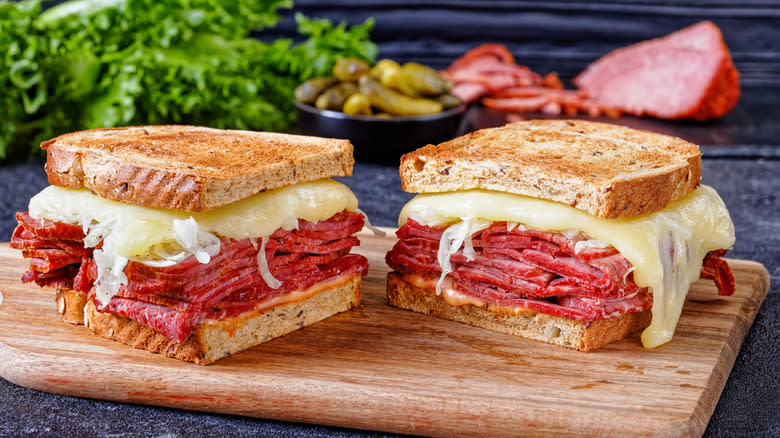
Nope, we're not done talking about bread just yet. If you find yourself slicing up rye at home to make a Reuben, just remember that the experts like to slice their bread thick. Not so thick that it overpowers the sandwich fillings themselves, but thick enough that you don't need to worry about the fillings making their escape before you can chow down on your sandwich.
Just like the toasting step, chefs slice their rye bread relatively thickly to prevent a Reuben from going too soggy. Stefano Mariota, executive chef at Brooklyn institution Gertie -- which makes its Corned Beef Reuben on sourdough rye -- cites this as his number one tip. "Remember the thick sliced bread," he advises. "Toast it well on both sides and you still have bread that's soft in the center but holds up to a Reuben."
Take that as your permission to go ham when slicing your bread -- but remember to keep some sense of consistency between slices. If one slice of bread is considerably more hefty than the other, then you'll likely throw off the balance of the entire sandwich. To cut like the professionals, try to use an actual bread knife (they tend to have serrated, rather than flat, edges) and cut at a 45-degree angle instead of starting out straight at the crust.
They Use Pastrami, Not Corned Beef
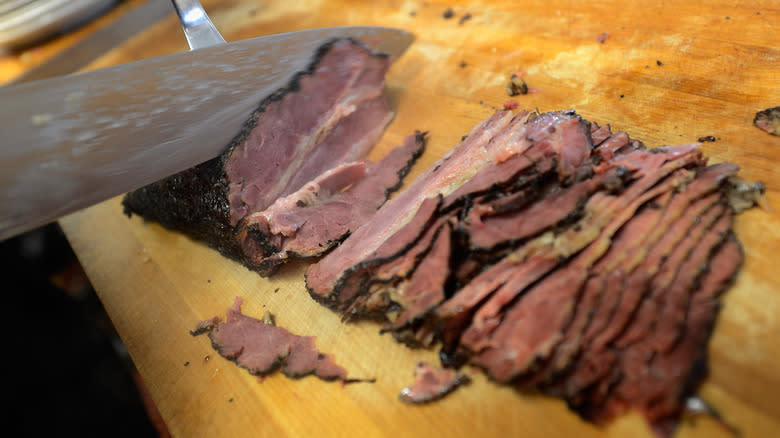
Not all deli meats are made equal. Technically speaking, a Reuben is supposed to use corned beef, lest it become a "Rachel Sandwich" (a term apparently coined in the 20th century, though it was reportedly named for the 1871 tune "Rachel and Reuben"). Regardless, the tastiest Reubens you'll find in delis and restaurants alike often opt for pastrami, which is typically more lean than corned beef and is smoked during the preparation process.
That's the case at Leven Deli & Co. "We prefer smoked meat over boiled meat," explains Anthony Lygizos. "We believe that responsible farming practices, costs, and yield make smoked pastrami the way to go. We make our own pastrami in-house, a 12-day process that begins with responsibly sourced brisket and a custom blend of spices. The aging, curing and smoking process takes nearly two weeks before the final product is ready. It's truly a labor of love, but it's well worth it when you bite into that perfect sandwich. Our pastrami isn't too salty and is tender and delicious."
You may not have the time, patience, or facilities to smoke your own pastrami at home for nearly two weeks, but the point still stands. The biggest difference between your homemade Reuben and one that's been bought in deli may be down to a reliance on the traditional corned beef.
Sauerkraut Is High Quality, Not From A Can
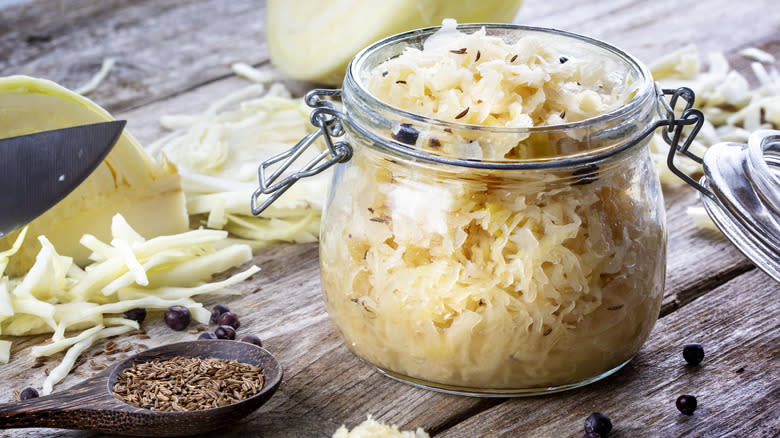
Sure, the meat is important, but we'd argue that sauerkraut is the real unsung hero of a Reuben. Making sauerkraut for yourself, however, is a time-consuming process that requires chopping up raw cabbage, cooking it in a mixture of herbs and vinegar, and leaving it to ferment for weeks at a time. This also requires some pretty precise environmental controls, with the ideal scenario being that you leave your sauerkraut to ferment for 21 days at a temperature between 65 and 72 degrees Fahrenheit.
Thanks to these complexities, homemade Reubens are often saddled with canned sauerkraut plucked straight from the shelves of your local grocery store. This is often pasteurized during the canning process, destroying some of the natural probiotics that can help your gut health, brain health, vitamin levels, and more. It should come as no surprise that the experts prefer homemade sauerkraut to canned sauerkraut. "We ferment our own sauerkraut and use a secret ingredient that gives it a very unique flavor," Elyssa Heller says when explaining what makes Edith's take on the Reuben so spectacular.
They're not the only ones. Over at Gertie, Stefano Mariota also advises finding the highest quality sauerkraut possible if you want to plate up a truly stellar Reuben sandwich. "The canned stuff just doesn't cut it," he warns. That doesn't necessarily mean you need to make it yourself. Instead, just look for sauerkraut in the refrigerator section -- not with the other shelf-stable products.
The Bread Is Made In-House
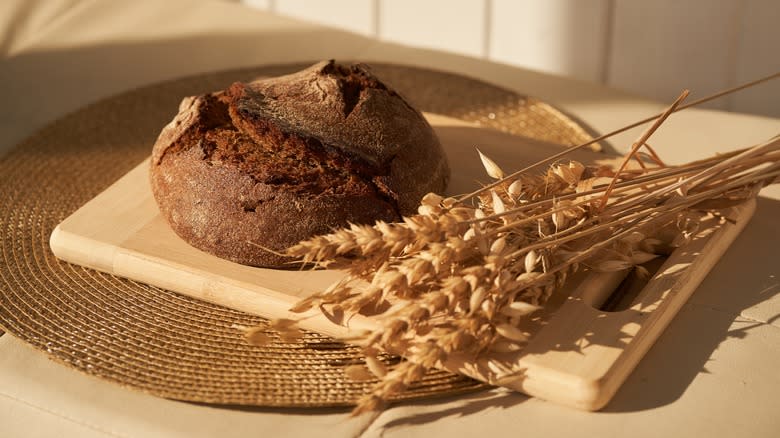
Nothing beats the taste (or smell) of fresh bread. It While rye bread is available in most grocery stores, plenty of delis, diners, and restaurants choose to make their own for this very reason. "Baking your own bread makes for the best sandwiches," says Levin Deli & Co. owner Anthony Lygizos. "There's no substitute for fresh-baked bread. We like our rye made with sourdough starter and plenty of caraway seeds."
Making your own bread may seem to be daunting at first, but the reality is that you spend more time waiting than you do actually baking. A basic rye bread only requires a handful of ingredients (bread flour, rye flour, sea salt, instant dried yeast, and water), which only takes a matter of minutes to mix. What follows is up to 18 hours of waiting for the dough to double in size.
If you want to try your hand at a rye bread with a sourdough starter like Levin Deli & Co. does, you'll need to be even more patient. Making a sourdough starter takes about five days in total, with most of that time spent waiting for the dough to ferment (and occasionally "feeding" it with a mixture of more water and rye flour). However, if that's the price to pay for a restaurant-quality Reuben, then we'll gladly take it.
They Don't Always Use Russian Dressing
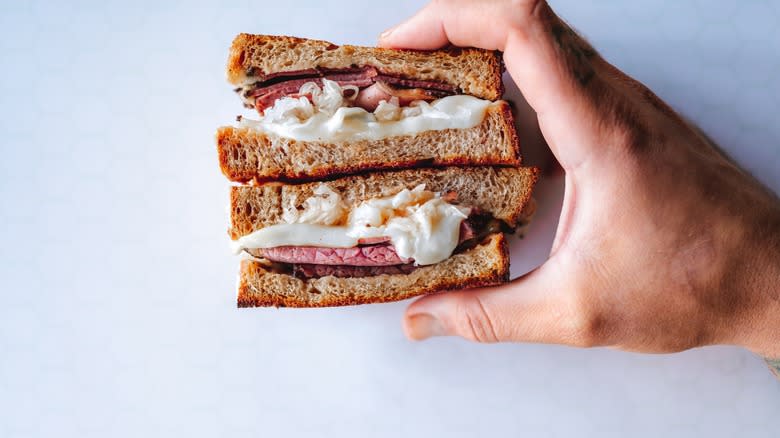
To many, Russian dressing is the default Reuben dressing for a reason. Creamy, sweet, and tangy, it's made with a combination of ketchup, mayonnaise, and an array of herbs that perfectly complements all the elements of a Reuben sandwich without drowning out the flavor of the meat or sauerkraut. Traditional though it may be, it's often swapped out for Thousand Island, which was actually the dressing used in one of the multiple purported origin stories for the Reuben sandwich. Like Russian dressing, Thousand Island also contains ketchup and mayonnaise, as well as chopped pickles and an array of lemon, orange, paprika, mustard, vinegar, and more. This gives it a similar flavor profile to Russian dressing -- except it's even sweeter.
In some instances, chefs swap out Russian and Thousand Island dressing and replace them with a totally different dressing, which may be why you've never managed to capture the taste of your favorite Reuben at home. "Instead of Thousand Island or a Russian dressing, we use our housemade special sauce, which is a rémoulade," reveals Elyssa Heller, founder of Edith's. "It's very similar in nature, but it just has more balanced, dynamic flavors." She prefers her homemade sauce to Russian dressing for one very important reason: "It's not as sweet as a Russian dressing. Sometimes you'll get a Russian dressing and it's just straight-up ketchup." If you're looking for something more complex to dress your Reuben, consider making your own smoky remoulade.
The Dressing Is Also Made Fresh
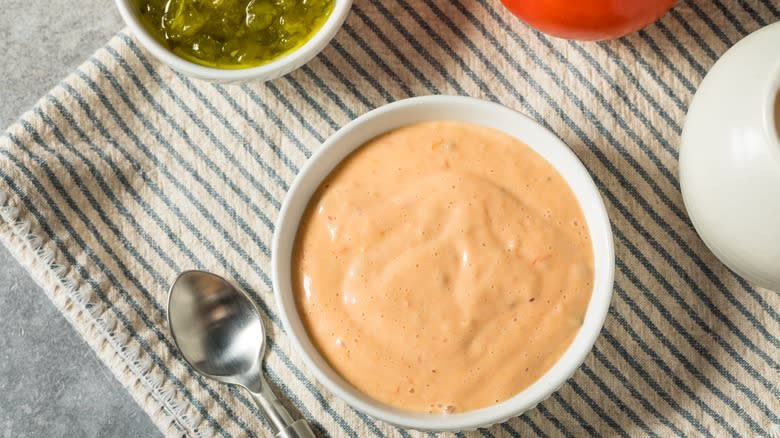
In case you hadn't noticed thanks to the meat and the bread, freshness is a recurring theme for an elite Reuben. There's no reason this shouldn't extend to the dressing, which is rarely poured straight from a store-bought bottle in the best delis and restaurants. As Leven Deli & Co.'s Anthony Lygizos puts it, "We believe that scratch-made ingredients make a huge difference."
At Edith's, the process for making the fresh dressing -- which is known there as "Edith's Special Sauce" -- is pretty lengthy. "There's about 15 different ingredients that go into our special sauce," Heller explains. It's worth the effort, though, with the final result being so popular that Edith's reports that its staff makes 100 pounds of sauce per week and sells additional dipping pots in-store (via Instagram).
The good news is that you don't need to follow a recipe this complex to make a fresh dressing at home. In fact, you probably already have most of the ingredients you need waiting for you in your pantry. Dietician Kristen Carli previously shared her homemade Russian dressing recipe with Mashed, which requires only a simple blend of mayonnaise, ketchup, relish, lemon juice, salt, and pepper. Even better, the whole process only takes three minutes, which is much quicker than the time it would take to go to the store, grab a bottle of dressing, and get to work on your Reuben. We'll call that a win-win.
They Follow The Perfect Ratio Of Cheese To Meat To Sauerkraut
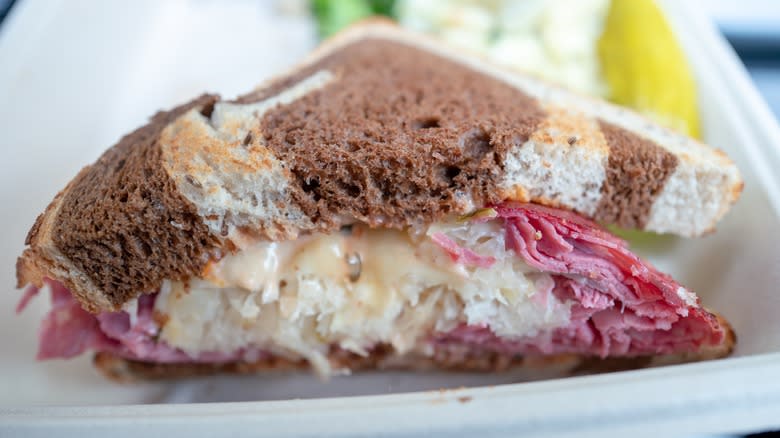
Cooking is a science. Tempting though it is to freestyle a dish, precise measurements can make a world of difference to a food's flavor and texture. Sandwiches don't exactly pop to mind as a food you must weigh out and measure during the prep process, but if you want to make a Reuben like you do it for a living, you had best get the scales out as soon as possible lest you risk spoiling the ratio (and, as a result, the flavor) of your sandwich.
Anthony Lygizos is extremely strict with his measurements for this reason. Each Reuben contains 6 ½ ounces of Swiss cheese and sauerkraut (for the perfect balance). Gertie is just as strict -- only with more extravagant amounts, and a slight edge for the sauerkraut. "I tend to go extravagant and overdo it a bit," executive chef Stefano Mariota admits, before revealing that each sandwich contains "8 ounces corned beef, 2 ounces cheese (two thick slices), and at least 3 ounces of sauerkraut."
Edith's, too, goes to straight lengths to ensure the right ingredient ratio. "We have everything measured and portioned and we're hand slicing pastrami us in the sandwich shop literally on a scale," says Elyssa Heller. "We're making sure that every single component is weighed out exactly. All the bread is sliced at the same thickness, we have timers on our flat top, so we try to keep everything as consistent as possible."
Each Element Of The Sandwich Is Added In A Specific Order
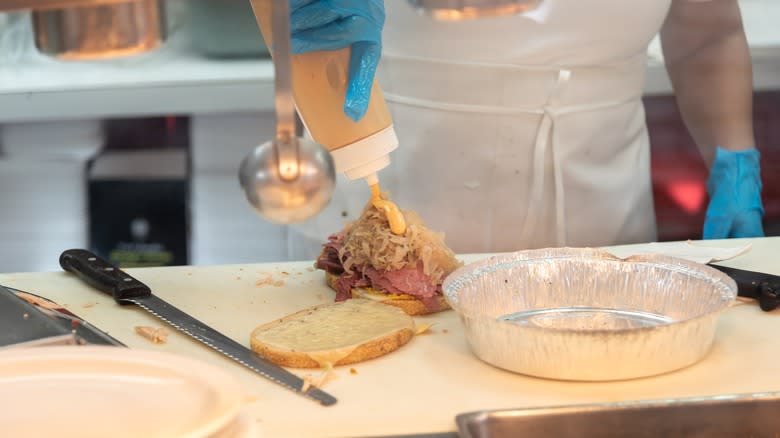
Throwing sandwich toppings haphazardly onto the bread isn't common practice in a professional environment. It's even more of a risk with a Reuben, which contains polarizing ingredients that could taint the taste and texture of the entire dish if applied incorrectly. That's why some restaurants have a standard Reuben assembly routine that dictates what goes where and when.
To prevent Reubens from going soggy, Leven Deli & Co.'s Anthony Lygizos is especially particular about where and when you place your sauerkraut. "The sequence of the ingredients ensures the sauerkraut is never right up against the bread and is insulated against the cheese," he explains. This cheese serves as a barrier that prevents the natural moisture of the sauerkraut from sogging up the bread (because, seriously, is anything worse than a wet sandwich?)
However, there's not necessarily one right way to stack your Reuben. Elyssa Heller is partial to a very different routine than what's used by Lygizos -- and ensures that the entire restaurant follows the same steps. "We do it in the same way every time," she says. "It's kraut first, then pastrami on top, then Emmental cheese. It's really a process; I don't think people realize how much goes into a really good sandwich." What sets the pros apart from the amateurs here is that they know how the order of ingredients impacts the final flavor. Ultimately, the trick is finding which flavor appeals to you.
Mustard Is Added For An Extra Kick
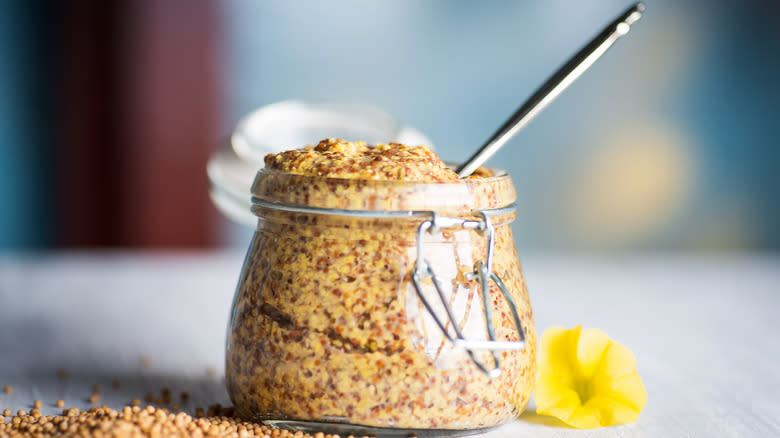
We're usually apprehensive about messing with a time-honored classic, but we trust the experts in the kitchens to know which additions put a valuable, tasty twist on a sandwich and which ones are just there for the sake of added novelty. Mustard falls firmly into the former camp, with Anthony Lygizos claiming that Leven Deli & Co. uses pickled mustard seeds in its dressing to boost the acidity of its Reuben. "Make sure you have plenty of acid," he generally advises.
Gertie's executive chef Stefano Mariota is also team mustard on a Reuben. "I love throwing some spicy brown mustard on there," he says, "but I also love throwing mustard on everything so I'm a little biased." Mustard famously pairs well with relatively fatty pastrami, making this the perfect addition for anyone who prefers their sandwiches with a little bit more of a kick -- not to mention the fact it's probably already in your fridge or pantry, ready for you to give it a try on your next DIY Reuben.
Tasty though it may be, don't feel like you necessarily need to add mustard -- or any other extra ingredients -- to your Reuben if it ultimately doesn't appeal to your tastebuds. "I think that most restaurants serving a really great Reuben are the ones falling back on generations of tradition in how they are prepared," Mariota adds. "If it ain't broke, don't fix it."
Read the original article on Mashed.


